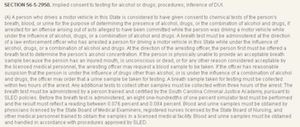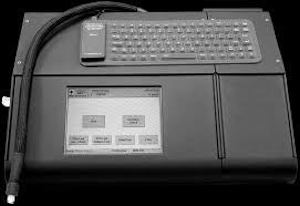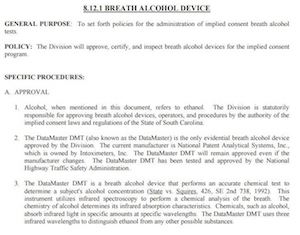Driving Under the Influence in South Carolina
- Extent that Faculties to Drive a Motor Vehicle
- Materially and Appreciably Impaired
- Under the Influence of any other Drug OR
- Under the Influence of a Combination of Drugs or Substances causing Impairment OR
- Under Combined Influence of Alcohol and any Drug or Drugs or Substances
DUI in South Carolina Stands for Driving Under the Influence.
- Driving a Motor Vehicle
- While Under the Influence:
- Alcohol
- Drugs
- Combination of Alcohol and Drugs
- Offer of Breath Test to Determine Alcohol Concentration
- Officer May Request Blood Sample
- Reasonable Suspicion of Under Influence of Drugs Other that Alcohol OR
- Under Influence of Combination of Alcohol and Drugs – Officer May Order Urine Sample
- Under the Influence – Materially and Appreciably Impaired
- Breath Samples MUST be collected within Two (2) Hours of Arrest
- Additional Tests MUST be collected with Three (3) Hours of Arrest
- Breath Test – Person Trained and Certified by South Carolina Criminal Justice Academy
- Blood and Urine Tests – Parties Authorized by Statute
- Type of Alcohol – Ethyl Alcohol or Ethanol
- DataMaster DMT – DataMaster
- Only Approved Device in South Carolina – Evidence
- Manufacturer: National Patent Systems NPS / Intoximenters
- Approved for Use – National Highway Traffic Safety Administration NHTSA
- Accurate Chemical Test of Alcohol Concentration
- IR InfraRed Spectroscopy for analysis
- Absorption of Light Energy
- Specified Wavelengths
- Three (3) Wavelengths for Determination of Ethanol
- .08 or Higher Breath Alcohol Content or BrAC
- .08 or Higher Blood Alcohol Content or BAC
- .08 or Higher Urine Content
- Under the Influence of Combination of Alcohol and Drugs
- Under the Influence of Alcohol – Opinion Testimony – Materially and Appreciably Impaired
- Must pass Initial Inspection by SLED Certified Breath Test Specialist
- Required before DataMaster DMT Certified
- In Addition To Manufacturer Inspection
- Includes (partial list):
- Visual Inspection for Software Signature
- Confirmation of Passwords
- Identification of Circuit Boards
- Panel and Breath Tube Inspection / Connection
- Check Valve Examination
- Connection of Inlet / Outlet Hoses for Simulator
- Simulator Temperature Verification
- Voltage Confirmation
- Date Time Verification
- Test Ticket Printout
- Calibration (0.08%) Ethyl Alcohol
- Linearity Checks – Three Separate / Different Concentrations

- Pursuant to South Carolina Code §56-5-2953
- Video Recording
- At the Incident Site
- Video Requirements – Incident Site
- Activation of Officer’s Blue Lights – No Later Than
- Any Field Sobriety Tests Administered
- Include Arrest of Person OR
- Probable Cause Determination of Violation 56-5-2945
- Miranda Rights – Person Being Advised
- Video Requirements – Breath Test Site
- Entire Breath Procedure
- Advisement Person is Being Video Recorded
- Right to Refuse Test
- DUAC stands for Driving with Unlawful Alcohol Concentration
DUI Presumptions and Inferences in South Carolina
- .050 or Less – Conclusively Presumed NOT Under the Influence of Alcohol
- .051 “Greater than five-hundredths of one percent” to .079 “Less than eight one-hundredths of one percent”
- May be considered with Other Evidence
- Does NOT give rise to any inference person was or was not under Influence
- .080 and Higher – May be Inferred “Under the Influence” of Alcohol
- Licensed Attorney in both North Carolina and South Carolina
- Experienced in handling matters involving Impaired Driving DUI DWI
- Helps clients with South Carolina cases in:
- Rock Hill
- Ft. Mill
- York
- Lancaster
- Indian Land
- York County
- Lancaster County
- **Licensed to practice law throughout State of South Carolina
- Helps clients with North Carolina cases in:
- Charlotte, Pineville, Matthews, Davidson, Cornelius – Mecklenburg County
- Gastonia, Cherryville, Belmont – Gaston County
- Monroe, Waxhaw – Union County
- Statesville, Mooresville – Iredell County
- Salisbury, Kannapolis – Rowan County
- Albemarle – Stanly County
- Anson County
- **Licensed to practice law throughout State of North Carolina
It’s just different in South Carolina. . .and that is not necessarily a bad thing. Having practiced in both states, I understand the similarities and differences of impaired driving law between the two Carolinas. Generally speaking, there are some similarities. The “gold standard” of sorts is the National Highway Traffic Safety Administration NHTSA. Things like Standardized Field Sobriety Tests or “dexterity tests” are, at least in part, predicated on the same standards nationwide. Indeed, it is called the “National Highway” administration.
At the same time, South Carolina has what some would deem more reasonable protocols on plea bargaining, lesser included offenses, and requirements for proof of offenses. For example, South Carolina sets forth certain “presumptions” and “inferences” based in part on breath alcohol, blood alcohol, and urine readings. A reading of .05 or less in South Carolina indicates a “Conclusive Presumption” that the accused is NOT Under the Influence.
North Carolina has no such presumption, except for the standard United States Constitutional precept that the accused is presumed innocent until proven guilty beyond a reasonable doubt. In North Carolina, the State can prove impairment in several different ways, only one of which involves impairment with a reading of .08 or higher. Both North and South Carolina allow for consideration of impairment by substances other than ethanol (drinking alcohol). South Carolina recognizes someone may be under influence of alcohol, drug(s), illegal and prescription drugs, and substances, either individually or in combination to one another.
The basis of stopping vehicles is similar. Many motorists traveling from South Carolina into North Carolina utilize one of two or three major interstate highways. They include I-77, Interstate 85 and to lesser extent, I-74. Given the varying speed zones, it’s not terribly unusual to see traffic stops involving speeding and other traditional moving violations involving following too closely, lane violations, and the like.
Assuming a motorist is pulled over legally, a law enforcement officer generally will not ignore signs of impairment. In fact, NHTSA breaks down an Impaired Driving investigation into three phases:
- Vehicle in Motion
- Personal Contact
- Standardized Field Sobriety Tests
Those protocols or standards are taught both in North Carolina and South Carolina, as are the indicators, clues, or cues associated with impairment or being under the influence of an impairing substance. Within the Vehicle in Motion aspect of an DUI investigation, police officers are looking for different aspects of driving that may give rise to Reasonable Suspicion that someone is driving under the influence. The list of Phase 1 – Vehicle in Motion indicators may include things like traveling below the posted speed-limit, failure to maintain lane control, following too closely, weaving within the lane of travel, failure to dim headlights, driving without headlights, failure to turn off turn signal, reckless or aggressive driving, and running off the road.
As one might imagine, there are many possible different indicators of possible impairment. Police Officers are also trained to watch for the response to emergency equipment, the failure to pull over in a timely fashion the failure to pull over in a safe location and things like that.
Once a vehicle is stopped, police officers normally begin Phase II – Personal Contact, where they are taught under NHTSA protocols to look for things like red, glassy eyes, an odor of alcohol, slurred speech, slow or delayed reactions, inability to stay on task, confusion as to location, direction of travel, or destination, inability to produce drivers license, registration or insurance, dropping, fumbling, or missing identification, evasive responses or actions, open containers of alcohol, profane, rude and disruptive responses or behaviors and the like. If an Police Officer requests someone to step from a vehicle for further investigation, they may watch for things like the failure to remove seat belt, the failure to place a motor vehicle in part, utilizing the door frame or other parts of the car to balance, stumbling, stutter stepping, using the vehicle for support, failing to follow officer instructions, messy or mussed clothing, odor of alcohol or drugs about the person, and things that may be associated with consumption of impairing substances.
Attorney Chris Beddow**- DUI Driving Under the Influence
- Attorney Chris Beddow
- Rock Hill
- Ft. Mill
- Lancaster
- Indian Trail
- York County, SC Legal Help
- Free, Confidential Consultation
**Attorney Chris Beddow is the only lawyer affiliated with the law firm Powers Law Firm, PLLC licensed to practice law in the State of North Carolina. Mr. Beddow is also licensed to practice law in the State of North Carolina. The contents of any and all materials within the Powers Law Firm, PLLC website, videos, and blog(s) have been prepared by and are the responsibility of Mr. Beddow. File responsibility and legal representation within the Courts of South Carolina is handled solely by Mr. Beddow.
Helpful Information About Criminal Charges Powers Law Firm PA Home
Powers Law Firm PA Home






















